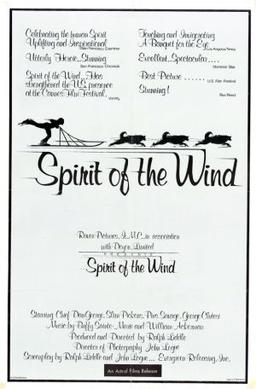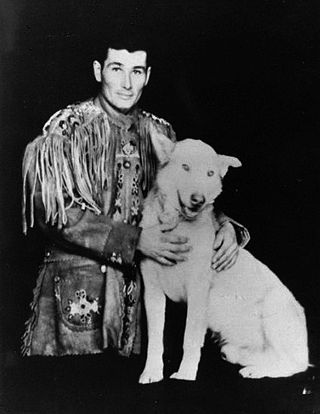Related Research Articles

The Iditarod Trail Sled Dog Race, more commonly known as The Iditarod, is an annual long-distance sled dog race held in Alaska in early March. It travels from Anchorage to Nome. Mushers and a team of between 12 and 16 dogs, of which at least 5 must be on the towline at the finish line, cover the distance in 8–15 days or more. The Iditarod began in 1973 as an event to test the best sled dog mushers and teams but evolved into today's highly competitive race.

A sled dog is a dog trained and used to pull a land vehicle in harness, most commonly a sled over snow.

Sled dog racing is a winter dog sport most popular in the Arctic regions of the United States, Canada, Russia, Greenland and some European countries. It involves the timed competition of teams of sled dogs that pull a sled with the dog driver or musher standing on the runners. The team completing the marked course in the least time is judged the winner.

Balto was an Alaskan husky and sled dog belonging to musher and breeder Leonhard Seppala. He achieved fame when he led a team of sled dogs driven by Gunnar Kaasen on the final leg of the 1925 serum run to Nome, in which diphtheria antitoxin was transported from Anchorage, Alaska, to Nenana, Alaska, by train and then to Nome by dog sled to combat an outbreak of the disease.

The Quebec Winter Carnival, commonly known in both English and French as Carnaval, is a pre-Lenten festival held in Quebec City. After being held intermittently since 1894, the Carnaval de Québec has been celebrated annually since 1955. That year, Bonhomme Carnaval, the mascot of the festival, made his first appearance. Up to one million people attended the Carnaval de Québec in 2006 making it, at the time, the largest winter festival in the world. It is, however, the largest winter festival in the Western Hemisphere.
Joe Redington, Senior was an American dog musher and kennel owner, who is best known as the "Father of the Iditarod Trail Sled Dog Race", a long distance sled dog race run annually from the Anchorage area to Nome, Alaska.
Dorothy G. Page was best known as "Mother of the Iditarod Trail Sled Dog Race", the 1,049-mile dog sled race across the U.S. state of Alaska.

DeeDee Ann Jonrowe is an American kennel owner and dog musher who is a three-time runner up in the Iditarod Trail Sled Dog Race. She is a very popular figure in the sport, and her completion of the 1,049-mile+ race in 2003 just three weeks after completing chemotherapy for breast cancer received widespread publicity.

Skijoring is a winter sport in which a person on skis is pulled by a horse, a dog, another animal, or a motor vehicle. The name is derived from the Norwegian word skikjøring, meaning "ski driving". Although skijoring is said to have originated as a mode of winter travel, it is currently primarily a competitive sport.

Ramy "Ray" Brooks is an Alaska Native kennel owner and operator, motivational speaker, and dog musher who specializes in long-distance races. He is a two-time runner up in the 1,049+ mi Iditarod Trail Sled Dog Race across the U.S. state of Alaska, and a former winner of the 1,000 mi (1,600 km) Yukon Quest dog sled race across both Canada and the U.S.

Woodsong is a book of memoirs by Gary Paulsen. The first half consists of Paulsen's early experiences running sled dogs in Minnesota and then in Alaska, and the second half describes the roads and animals he faces in the Iditarod Trail Sled Dog Race.

The City of Wasilla (Dena'ina: Benteh) is a city in Matanuska-Susitna Borough, United States and the fourth-largest city in Alaska. It is located on the northern point of Cook Inlet in the Matanuska-Susitna Valley of the southcentral part of the state. The city's population was 9,054 at the 2020 census, up from 7,831 in 2010. Wasilla is the largest city in the borough and a part of the Anchorage metropolitan area, which had an estimated population of 398,328 in 2020.
Fur Rondy has been held in Anchorage, Alaska during the late winter since 1950. It is a celebration of the time when trappers would return to the city to gather and share stories, sell their furs and antlers, and to socialize. It also commemorates the start of the Iditarod. One part of Fur Rondy is the Miners and Trappers Ball, which is a fundraiser for the Lions Club's of Alaska. The Miners and Trappers Ball has a yearly theme focused on one part of Alaskan life. The highlight of the Miners and Trappers Ball is the Mr. Fur Face beard contest. The contest is sponsored by the South central Alaska Beard and Mustache Club.
Ice bowling is a variant of traditional ten-pin bowling in that it is played on ice, usually outdoors.

Spirit of the Wind is a 1979 American Northern film directed by Ralph Liddle and starring Chief Dan George, Slim Pickens, Pius Savage, and George Clutesi.

Albert Campbell was French-Cree (Métis) Canadian musher and trapper. He gained popularity as a Canadian "national hero" after winning the 1917 Red River Derby sled dog race.

George Attla was a champion sprint dog musher. Attla won ten Anchorage Fur Rendezvous Championships and eight North American Open championships with a career that spanned from 1958 to 2011. Attla was the subject of a 1993 book titled George Attla: The Legend of the Sled-dog Trail, by Lewis "Lew" Freedman.
The Northern Manitoba Trappers’ Festival is an annual winter festival held in February in The Pas, Manitoba, Canada. It is Manitoba’s oldest festival and one of Canada’s oldest winter festivals. The festival celebrates a wide variety of skills and activities that were, and in many cases still are, a matter of survival for life in Northern Canada, including ice fishing, muskrat skinning, tea boiling, bannock baking, and chain saw events. The highlight of the festival is the sled dog race, known as the World Championship Dog Race.
References
- ↑ "Winter Carnivals", National Geographic Traveler, January/February 2012.
- ↑ Running of the Reindeer listing, official Fur Rondy website. Accessed 2017.